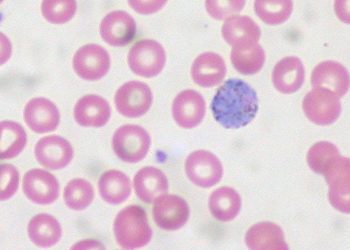Past infection with pre-omicron variants of COVID-19 protects against re-infection
1. Past infection with ancestral, alpha, beta, and delta variants of COVID-19 had a protection rate of approximately 78% against re-infection after 40 weeks.
2. Protection against re-infection was substantially lower for the omicron BA.1 variant compared to the other variants and this protection declined more rapidly over time.
Evidence Rating Level: 1 (Excellent)
Study Rundown: Understanding the strength of protection from previous infection with COVID-19 is important for informing public health guidelines. This systematic review and meta-analysis analyzed studies examining the protective effect of COVID-19 natural immunity. Past infection with COVID-19 pre-omicron variants (ancestral, alpha, beta, and delta) protected against re-infection and this protection remained high after 40 weeks. By comparison, the protection conferred from infection with the omicron BA.1 variant was nearly half that of other variants and declined more rapidly over time. Interestingly, all variants provided similar levels of protection against severe illness (i.e., hospitalization or death), including omicron BA.1. Limitations of this study include the limited number of studies, particularly for those that report on the omicron BA.1 variant. Nevertheless, this study provides good evidence that COVID-19 infection with pre-omicron variants provides substantial immunity against re-infection. Compared to vaccines, this benefit is similar to the protection provided by two-dose mRNA vaccines.
Click to read the study in The Lancet
Relevant Reading: Assessment of protection against reinfection with SARS-CoV-2 among 4 million PCR-tested individuals in Denmark in 2020: a population-level observational study
In-Depth [systematic review and meta-analysis]: In this living systematic review and meta-analysis, retrospective and prospective cohort studies and test-negative case-control studies on protection from past COVID-19 infection were analyzed. Inclusion criteria consisted of any study with results for the protective effect of COVID-19 natural immunity in individuals who were non-vaccinated in comparison with those who were non-vaccinated and COVID-19 naïve. Included studies were published from inception up to Sept 31, 2022. Studies that only had results for hybrid immunity (vaccination and prior infection) were excluded. The primary outcome was re-infection defined by the following: a positive SARS-CoV-2 PCR test or a rapid-antigen test (RAT) greater than 90 days (or 120 days in some studies) after a previous positive PCR test or RAT (prior infection), or two positive PCR tests or RATs separated by four consecutive negative PCR tests, or a positive PCR test or RAT in an individual with a positive IgG SARS-CoV-2 anti-spike antibody test. Re-infection was also classified as symptomatic or severe, leading to hospitalization or death.
A total of 65 studies were identified. Protection against re-infection was high for the ancestral, alpha, beta and delta variants with a mean pooled estimate greater than 82%. However, protection against re-infection for the omicron BA.1 variant was only 45.3% (95% UI 17.3-76.1). The results for protection against symptomatic disease were similar (greater than 82% for ancestral, alpha, beta and delta variants and only 44.0% for omicron BA.1). Protection against severe disease was high for all variants, including omicron BA.1, with a mean protection of 78% or greater for ancestral, alpha, beta, delta, and omicron BA.1. At 40 weeks post-infection, protection from re-infection decline for ancestral, alpha, and delta variants with 78.6% (49.8-93.6). This decline was more rapid for the omicron BA.1 variant and was estimated to be at 36.1% (24.4-51.3) at 40 weeks. Protection against severe infection remained high for all variants at 40 weeks with 90.2% (69.7-97.5) for ancestral, alpha, and delta variants, and 88.9% (84.7-90.9) for omicron BA.1.
Image: PD
©2023 2 Minute Medicine, Inc. All rights reserved. No works may be reproduced without expressed written consent from 2 Minute Medicine, Inc. Inquire about licensing here. No article should be construed as medical advice and is not intended as such by the authors or by 2 Minute Medicine, Inc.






